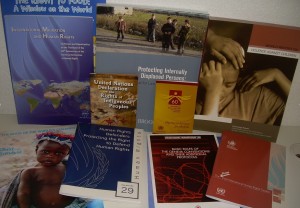There are more than 500 written international agreements or treaties registered or filed and recorded with, and published by, the Secretariat of the UN since 1946 which deal with issues as diverse as Refugees, Antarctica, Nuclear test bans and Desertification.
However there are nine core international conventions or treaties developed by the United Nations that focus on human rights and which are overseen by the different human rights monitoring mechanisms in the United Nations system. These are:-
International Convention on the Elimination of All Forms of Racial Discrimination(1965)
International Covenant on Civil and Political Rights (1966)
International Covenant on Economic, Social and Cultural Rights (1966)
Convention on the Elimination of All Forms of Discrimination against Women (1979)
Convention against Torture and Other Cruel, Inhuman or Degrading Treatment or Punishment (1984)
Convention on the Rights of the Child (1989)
International Convention on the Protection of the Rights of All Migrant Workers and Members of Their Families (1990)
International Convention for the Protection of All Persons from Enforced Disappearance (2006)
Convention on the Rights of Persons with Disabilities (2006)
These Conventions or Treaties are binding on the states parties that have agreed to them and oblige them to comply with human rights standards.
The monitoring of the implementation of these core treaties is usually overseen by a UN appointed committee of independent experts, and countries that have committed to the treaties are required to report regularly to the committee.
(The Committee to oversee the Convention relating to the Protection of all Persons from Enforced Disappearance has not yet come into force)
There are also other United Nations bodies and entities involved in the promotion and protection of human rights such as the UN High Commission for Refugees, the International Labour Organization, The World Health Organization etc.
